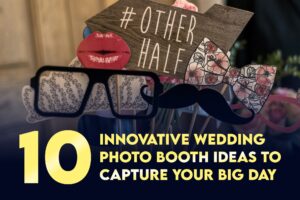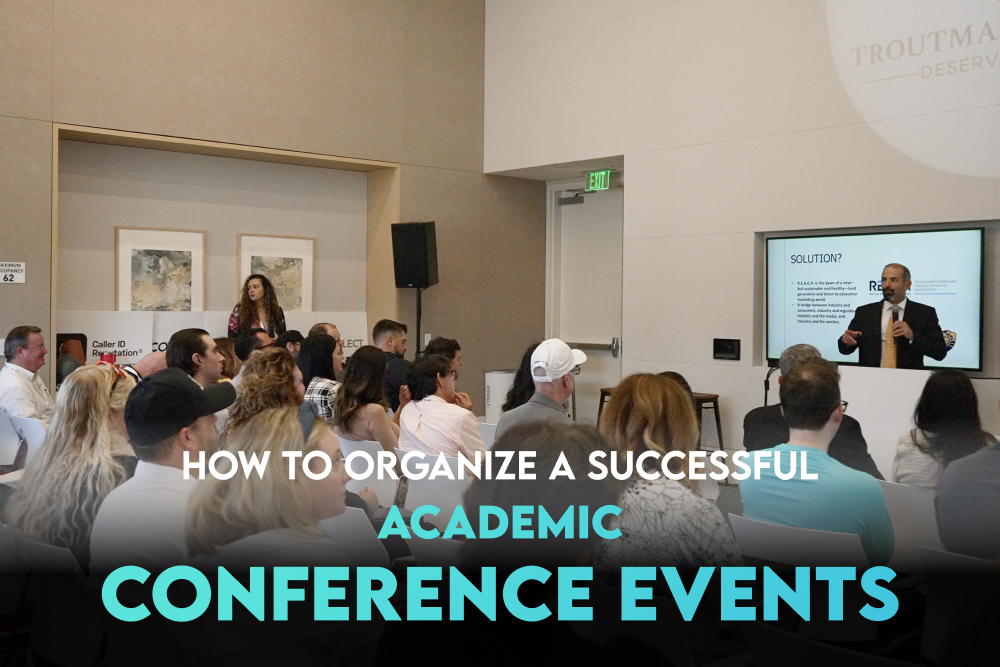

Head of HR at Rent For Event

Head of HR at Rent For Event
Conferences are the lifeblood of the academic community. These events serve as hubs for knowledge exchange. They’re also valuable for research dissemination and professional networking.
But the journey to a successful academic conference requires thoughtful preparation and execution.
In this post, let’s explore how you can make your educational seminar a success. As a result, you can leave a lasting impact on attendees and contributors alike.

Academic conferences offer opportunities for professors to present their research. Moreover, they can gain valuable feedback from peers and experts.
Engaging in vibrant discussions and attending an academic presentation enrich their knowledge. As a result, it keeps them updated on the latest developments in their areas of expertise.
Students, too, can enjoy academic conferences. These events provide a platform for students to present their research.
As a result, it can pave the way for recognition within the academic community.
Attending conferences also exposes students to cutting-edge research. So, this could inspire their academic pursuits.
Meanwhile, event organizers can foster a sense of community and intellectual exchange. This can be more fulfilling and satisfying for them.
Preparing a successful academic conference event requires plenty of research and careful planning. Here are the steps to achieve this:
These are the factors to consider to find the perfect venue:
Selecting an ideal conference venue and location is an important decision. It can impact attendance and the conference experience.
Factors to consider include:
Convention centers are popular event space options for their area and ambiance.
A comfortable and well-equipped conference venue is essential for a successful event. Participants should feel at ease to boost their learning.
As such, this will allow them to focus on the academic content without distractions.
Providing amenities enhances the conference experience. These can include:
Crafting a well-structured conference program requires careful consideration of content and timing.
As such, you can integrate key components to ensure a diverse and engaging program. This includes:
Coordinate with the keynote speakers well in advance. This way, you can understand their presentation objectives.
Moreover, you can tailor their talks to resonate with the audience.
Additionally, give adequate time for Q&A sessions following the keynotes. This encourages dynamic discussions and enables attendees to seek clarification from the speakers.
When planning panel discussions, identify relevant and compelling topics for the main theme. You should also choose panelists who can provide expert insights.
Organize paper presentations into themes based on shared topics or research areas. This approach enables attendees to attend sessions that align with their interests.
Additionally, it fosters fruitful discussions among like-minded researchers.
Talk to industry experts or seasoned academics and invite them as workshop facilitators. This way, you ensure the sessions offer valuable and actionable insights.
Also, limit the number of participants to maintain an intimate learning environment. Plus, doing so promotes active engagement.
Additionally, tailor the conference program to accommodate all types of participants.
A mix of topics and formats will cater to the diverse needs of attendees. As such, this can spark curiosity and engagement.
Moreover, give enough time between sessions to:
Powerpoint slides are powerful tools to convey information. Encourage presenters to use clear and simple visuals. This way, they can avoid information overload and distracting animations.
Visual aids supplement verbal presentations, making complex concepts more accessible to the audience. Leverage these to reinforce key messages:
Make sure that your academic conference has the right tools and technology.
Having the necessary equipment in place enhances the experience for participants. Plus, it reflects your commitment to organizing a successful conference.
Here are key considerations for ensuring you have the right equipment:
Invest in high-quality audio-visual equipment. This way, you ensure clear and uninterrupted communication during presentations and discussions.
This includes:
You can also opt for TV rental to ensure your academic conference is a great experience. Renting a smart TV or digital display can be a cost-effective and practical solution.
Remember to conduct thorough tests before the event. This can help you troubleshoot any technical issues with the equipment.
Encourage presenters to use standardized formats to ensure compatibility with the conference equipment. This includes Powerpoint presentations and PDFs.
Also, check the compatibility of presentation files in advance to avoid last-minute glitches. If possible, provide technical support to assist speakers during their presentations.
For poster presentations, make sure you have adequate poster boards or displays. These are valuable for participants to showcase their research findings. Label each poster board with the presenter’s name and presentation number.
Use technology for smooth registration processes and networking opportunities. Consider using conference apps or online platforms that allow attendees to:
These platforms can also help with online registration and provide real-time updates.
Incorporate live streaming options for those who can’t attend in person. Virtual attendance options enable broader participation. It can also attract international speakers and attendees.
Make sure you have the tools to stream presentations. It’s also helpful to engage virtual participants through Q&A sessions.
Having charging stations throughout the conference venue is essential.
Ensure that these are accessible to all. This way, you can keep participants connected throughout the event.
Make sure your conference reaches its target audience and gets the most out of the event by:
Promoting an academic conference involves employing a multi-faceted approach. Use various tools to spread the word about the event, including:
In today’s digital age, social media platforms play a pivotal role in event promotion. Create dedicated social media pages or event hashtags to:
Engage with the audience by responding to comments and encouraging discussions. This way, you foster a sense of community around the event.
Leverage email marketing to keep potential attendees informed and engaged throughout the preparation. Send out regular newsletters with updates on:
A well-designed conference website can serve as a central hub for your event.
Ensure that the website includes a clear and compelling call to action. It should also provide details of the conference.
This way, you make it easy for visitors to navigate and find the information they need.
Establish partnerships to widen your reach within the academic community. Consider working with:
Seek endorsements or support from renowned professors and researchers. This way, you can attract participants and enhance the credibility of your event.
Collaborating with academic institutions can also help in securing sponsorships and resources.
Boost networking sessions and social events to foster interactions among attendees. Encourage participants to:
Additionally, you can collaborate with industry organizations. By doing so, you provide attendees with opportunities to connect with industry experts.
Industry representatives can offer valuable insights and potential career prospects.
Organizing a successful academic conference event requires meticulous planning. It also entails a passion for academic excellence.
Put in the effort and time in planning and executing your vision. This way, you can create a memorable experience for all participants.
Renting proper audiovisual equipment with a full-production AV company aids the learning process. This way, they can hear, see, and remember key points from the speakers.
Embrace the challenges and opportunities of academic event organization. Don’t be afraid to let your dedication drive the advancement of knowledge within your field.